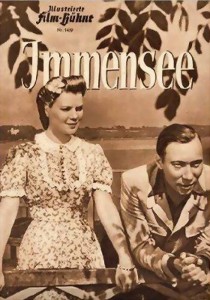Immensee (film)
| Immensee | |
|---|---|
 |
|
| Directed by | Veit Harlan |
| Screenplay by | Alfred Braun, Veit Harlan |
| Based on |
Immensee by Theodor Storm |
| Starring | |
| Music by | Wolfgang Zeller |
|
Production
company |
|
|
Release date
|
|
|
Running time
|
88 minutes |
| Country | (Nazi) Germany |
| Language | German |
Immensee: ein deutsches Volkslied (Immensee: A German Folksong) is a German film melodrama of the Nazi era, directed in 1943 by Veit Harlan and loosely based on the popular novella Immensee (1849) by Theodor Storm. It was a commercial success and, with its theme of a woman remaining faithful to her husband, was important in raising the morale of German forces; it remained popular after World War II.
Elisabeth (Kristina Söderbaum) falls in love with Reinhardt (Carl Raddatz), but he leaves their native village to study music, travel the world and build his career as a composer. His most important compositions are inspired by his love for her, Twelve Songs of Elisabeth and Seerosen (water lilies, the couple's special flower), but after she visits him on the day of his final examination at the conservatoire and finds a strange woman asleep in his bed, Elisabeth marries Erich (Paul Klinger), the wealthy heir to the estate of Immensee. Reinhardt returns to win her back, and Erich releases her, telling her that all that he wants is for her to be happy. This causes Elisabeth to realise what love really means and she tells Erich for the first time that she loves him, and remains with him. In the frame story, many years have passed, Erich is dead and Elisabeth and Reinhardt, who is now a renowned composer, meet for tea at his hotel after a performance of his Seerosen; at the end of the film, she tells him she will remain true to Erich and to Immensee, and he leaves for the last time.
The film is loosely based on Theodor Storm's novella of the same title. The scene where Elisabeth finds a woman in Reinhardt's bed had been omitted from the novella on the advice of friends of the author, and two thirds of the novella takes place in Elisabeth and Reinhardt's childhood; instead of using child actors, Harlan chose to cut these scenes and artificially age the two lovers for different stages of their lives (from about 18 to 45 for Elisabeth). Both Söderbaum and Raddatz were 31 at the time of filming. Despite being subtitled Ein deutsches Volkslied (a German folksong), the film also omits a conversation about folksongs which is important in the novella, in which Erich is dismissive but Reinhardt expounds a German Romanticist view entirely in accord with National Socialism, that "[Folksongs are] not made at all; they grow, they fall out of the sky" and refers to a melody sung by a shepherd as Urtöne (ancient tones) which "sleep on forest floors; God knows who found them."
...
Wikipedia
